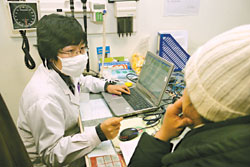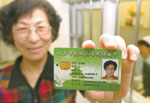| Home / Health / News | Tools: Save | Print | E-mail | Most Read |
| Why Digital Healthcare Is Catching On |
| Adjust font size: |
Ma Lingzhi felt uncomfortable early that morning. Following routine, the 71-year-old, hypertension patient made the 10-minute walk from her home to the Jiaodong Community Clinic in Beijing. She saw the doctor immediately upon arrival. There was no registration, no forms to fill out, no floundering for folders, no hassle.
The compiling of health records and the writing of prescriptions is all computerized at a community clinic in Dongcheng District. Doctor Liu Dong simply swiped Ma's green medical card in his laptop, instantly bringing her medical history up on the screen. Within minutes, Liu had put his digital signature on Ma's digital prescription. From there, Ma walked to the clinic's pharmacy, where she ordered and purchased her medicine with another swipe of her card. These cards provide a new kind of community healthcare service introduced in Dongcheng District in Beijing. By the end of 2006, more than 60,000 residents in the district had a green medical card. This new type of digitalized medical care ensures long-term and continuous medical service for residents, while monitoring medical workers' practices, said Ni Dong, deputy director of the information office of the Dongcheng District Community Healthcare Management Center. All of the doctors' work, including compiling health records and writing prescriptions, is done via computer. These doctors even take their laptops on home visits. The laptops' GPS systems make their traces easy to monitor.
A green medical card provides a new kind of community healthcare service introduced in Dongcheng District of Beijing. In the management center, a large screen shows the real-time distribution of patients and doctors, the demand for drugs, and prescriptions issued among the district's 46 community clinics. In addition, the computers can display the epidemiological status of major chronic diseases such as hypertension, coronary heart disease, diabetes, stroke and cancer in the district. Data can be displayed within areas of any geographic range by simply enclosing the range on the map. The screen will even show a particular resident's address and medical records. According to Chen Shupeng, senior academician of the Chinese Academy of Sciences, the ability to locate individuals is the biggest boon of information technology. He believes that applying the state-of-the-art technology to healthcare will help medical workers deal with emergencies such as bird flu. "Information technology provides the platform doctors need to make the quick responses to save lives," he said. (China Daily January 17, 2007) |
| Tools: Save | Print | E-mail | Most Read |
 |
| Related Stories |
|

